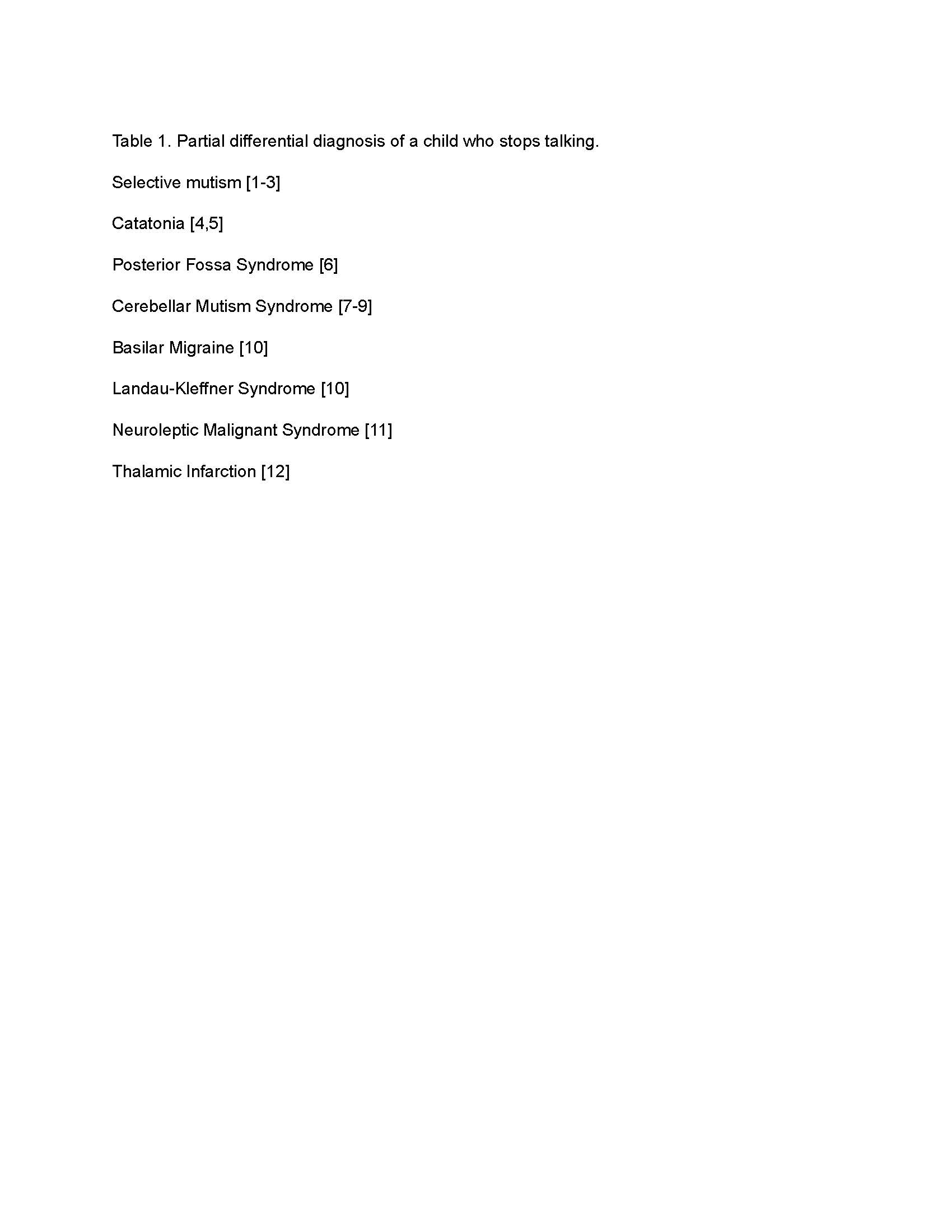Category: Pediatric Movement Disorders
Objective: To assess the feasibility of reliable, remote assessments of videos of a 13-year-old boy who stopped talking
Background: The sudden absence of speech in a child may reflect selective mutism, catatonia, and other conditions [Table 1]. Since health crises, international conflicts, and other catastrophes may prevent in-person evaluations, a protocol for expert raters to remotely evaluate a clinical assessment of a child who stopped speaking is needed.
Method: A 13-year-old boy with autism spectrum disorder (ASD) was told by his teacher that he would not be promoted to eighth grade. When he went home, he told his mother that he wanted to be promoted to eighth grade. Those were the last words that he ever spoke. He then made clicking sounds for a few weeks before stopping talking completely [13-15].
At age 16, his providers constructed a videotape to demonstrate the salient features of his neurological examination.
The authors then viewed the videotape of the clinical examination on individual monitors. The videotape was viewed once before each independent scoring session of structured assessments for catatonia in adults [16] and children [17] and the diagnostic criteria [4].
Results: Raters attained agreement on items for diagnostic criteria [4] [Table 1] and for some items of the rating scales for adults [16] [Table 3] and children [17] [Table 4]. Raters scored “x” when the item could not be rated based on the videotape of the clinical assessment. A period (.) was entered to record missing data.
Conclusion: Three trained raters can reliably independently rate a videotape of a clinical assessment of a 16-year-old boy with catatonia. Although Likert rating scales with categorical levels of severity [16,17] facilitate the application of precision medicine to formulate a comprehensive treatment plan tailored to the needs of each individual patient, they attained lower percentage agreements than categorical (absent/present) diagnostic criteria [4]. Therefore, administration of the structured rating scales [16,17] after the administration of the indicated prompts represents an accurate way to gauge the severity of the condition for a precise treatment plan. Items from a structured assessment interview and examination requiring specific stimuli by the examiner may be difficult to assess from a clinical interview without the required prompts.
Table 1. Partial differential diagnosis.
Table 2. Scores for diagnostic criteria [4].
Table 3. Bush-Francis Catatonia Rating Scale [16].
Table 4. Pediatric Catatonia Rating Scale [17].
References: 1. American Psychiatric Association: Diagnostic and Statistical Manual of Mental Disorders, Fifth Edition. Arlington, VA, American Psychiatric Association, 2013, pp 119-121.
2. Letamendi AM, Chavira DA, Hitchcock CA, Roesch SC, Shipon-Blum E, Stein MB. Selective Mutism Questionnaire: measurement structure and validity. J Am Acad Child Adolesc Psychiatry 2008; 47(10): 1197-1204.
3. Viana AG, Beidel DC, Rabian B. Selective mutism: a review and integration of the last 15 years. Clin Psychol Rev 2009; 29: 57–67. https://doi.org/10.1016/j.cpr.2008.09.009
4. American Psychiatric Association: Diagnostic and Statistical Manual of Mental Disorders, Fifth Edition. Arlington, VA, American Psychiatric Association, 2013, pp 195-197.
5. Brasic JR, Farhadi F. Catatonia. Medscape Drugs & Diseases. Updated September 18, 2023. Available at: http://emedicine.medscape.com/article/1154851-overview (accessed March 12, 2024).
6. Hashem H, Muhsen BA. Hyperleukocytosis-induced stroke and tonsillar herniation: case report. Ann Med Surg (Lond) 2021; 70: 102776. https://doi.org/10.1016/j.amsu.2021.102776.
7. Arai Y, Okanishi T, Oguri M, Kanai S, Fujimoto A, Maegaki Y. Power and connectivity changes on electroencephalogram in postoperative cerebellar mutism. Brain Dev 2022; 44: 759-764. https://doi.org/10.1016/j.braindev.2022.06.006.
8. Catsman-Berrevoets C, Patay Z. Cerebellar Mutism Syndrome. In: Manto M, Huisman TAGM. Eds. Handbook of Clinical Neurology, Vol. 155 (3rd series). The Cerebellum: Disorders and Treatment. 2018; p273-288. https://doi.org/10.1016/B978-0-444-64189-2.00018-4.
9. Schmidt S, Kovacs E, Usta D, Behnisch R, Sahm F, Haux D, Witt O, et al. Cerebellar Mutism Syndrome after posterior fossa tumor surgery in children—a
retrospective single-center study. World Neurosurg 2023; 173: e622-e628. https://doi.org/10.1016/j.wneu.2023.02.117.
10. Gordon N. Mutism: elective or selective, and acquired. Brain Dev 2001; 23: 83-87.
11. León-Amenero D, Huarcaya-Victoria J. Síndrome neuroléptico maligno en niños y adolescentes: revisión sistemática de reportes de caso [Neuroleptic malignant syndrome in children and adolescents: systematic review of case reports]. Rev Colomb Psiquiatr 2021; 50: 290–300. https://doi.org/10.1016/j.rcp.2019.10.003
12. Pluchon C, Jaafari N, Loiseau-Corvez M-N, Parizel A, Vandermarcq P, Hankard R, Gil R. A child with mutism after bilateral thalamic infarction. J Clin Neurosci 2011; 18: 1738-1740.
13. Brasić JR, Zagzag D, Kowalik S, Prichep L, John ER, Liang HG, Klutchko B, et al. Progressive catatonia. Psychol Rep 1999; 84 (1): 239-246. https://doi.org/10.2466/pr0.1999.84.1.239 PubMed PMID: 10203957.
14. Brašić JR, Zagzag D, Kowalik S, Prichep L, John ER, Barnett JY. Clinical manifestations of progressive catatonia. German Journal of Psychiatry. 2000; 3 (2): 13-24.
15. Brasic J. Refractory progressive catatonia in autism spectrum disorder. Abstract Number 213. XXVII World Congress on Parkinson’s Disease and Related Disorders. 1-4 May 2022, pages 218-219. [abstract] https://www.iaprd-world-congress.com/inhalt/uploads/2022/04/IAPRD2022-Abstract-E-Book.pdf
16. Bush G, Fink M, Petrides G, Dowling F, Francis A. Catatonia. I. Rating scale and standardized examination. Acta Psychiatr Scand 1996: 93: 129-136.
17. Benarous X, Consolia A, Raffin M, Bodeau N, Giannitelli M, Cohen D, Olliac B. Validation of the Pediatric Catatonia Rating Scale (PCRS). Schizophr Res 2016: 176: 378–386.
To cite this abstract in AMA style:
N. Kadubandi, A. Elshourbagy, J. Brašić. Feasibility of Reliable, Remote Assessment of a 13-year-old Boy Who Stopped Talking [abstract]. Mov Disord. 2024; 39 (suppl 1). https://www.mdsabstracts.org/abstract/feasibility-of-reliable-remote-assessment-of-a-13-year-old-boy-who-stopped-talking/. Accessed December 13, 2025.« Back to 2024 International Congress
MDS Abstracts - https://www.mdsabstracts.org/abstract/feasibility-of-reliable-remote-assessment-of-a-13-year-old-boy-who-stopped-talking/


![Table 2. Scores for diagnostic criteria [4].](https://www.mdsabstracts.org/wp-content/uploads/2024/09/0863_1287_000250_2.jpg)
![Table 3. Bush-Francis Catatonia Rating Scale [16].](https://www.mdsabstracts.org/wp-content/uploads/2024/09/0863_1287_000250_3.jpg)
![Table 4. Pediatric Catatonia Rating Scale [17].](https://www.mdsabstracts.org/wp-content/uploads/2024/09/0863_1287_000250_4.jpg)